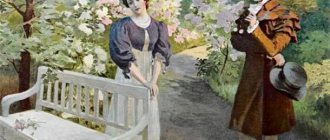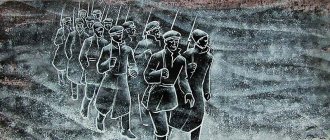- Essays
- On literature
- Pushkin
- Reasoning on the poem Poltava by Pushkin
The literary work “Poltava”, written by the great Russian poet Alexander Sergeevich Pushkin in 1828, is dedicated to one of the significant events in the history of our country.
The poem describes the heroism of a Russian soldier in the most difficult battle of the young country. According to the author, in this battle Peter’s army showed its consistency, strength of character, was able to fight on equal terms with the best army of Europe at that time and win.
Pushkin in his work praises the personality of the young tsar in bright colors and draws a parallel between the patriot Peter the Great and the hetman of Ukraine, the traitor Mazepa.
The young tsar is surrounded by like-minded people, which cannot be said about the Ukrainian traitor. Mazepa is passionate about the idea of his own benefit, while Peter thinks about the good for the state.
The parallel between Charles XII and Peter is also present in the work. The Swedish king is confident in his victory, he is proud, cunning and determined, but he himself will never go into battle, which cannot be said about the future first Russian emperor. He is among the soldiers, and by personal example he inspires them to perform great feats for the glory of Russia.
Pushkin is trying to convey to the reader the idea that every person and every action is important on the battlefield. It also touches on the fate of people who did not directly participate in the Poltava battle. A striking example of this is Mazepa’s beloved Maria. Despite the various hardships of fate, despite hardships and curses, she finds her feminine happiness, proving to the reader and herself that a person is free to build and enjoy his own happiness, his own destiny.
By the way, “Poltava” was not appreciated by the poet’s contemporaries. Such works had not existed before in the world of Russian literature, which was one of the main reasons for this. However, Pushkin himself admired his creation and was upset by the fact that the work did not find worthy appreciation among his colleagues in the poetry workshop.
The poem was written in a style unusual for the 19th century, which sets Pushkin’s “Poltava” apart from other military works of the first third of the century before last. Re-reading it again and again, you can immerse yourself in the very thick of those great events and feel the triumph of the moment when Russia became a great military power!
Essay on the topic Poltava poem by Pushkin
The poem is dedicated to the historical fate of Russia, in particular, the victory of Russia over Sweden. And it happened near the glorious city of Poltava, in Ukraine. To give greater authenticity to the events, Pushkin specifically uses many Ukrainian words and describes pictures of local nature.
The first topic that Pushkin develops is the topic of the fate of Russia in the world, among other European states. Will Russia be able to defend its independence and territorial integrity? As history has shown, and more than once, it can, as long as it can.
It was not for nothing that the great Chancellor of Germany, Otto von Bismarck, said that there was no point in fighting with Russia. It's worth being friends with her. This is still true today. But apparently, some government officials have forgotten this order and are trying to “induce” other countries to join a crusade against Russia.
With what pride and rapture the poet describes the scenes of the Battle of Poltava. It is clear that he really likes Peter the Great. He describes him before the battle: “his face is terrible, his movements are fast, he is beautiful.” Peter wants to start the battle as quickly as possible.
Here he rushes like a whirlwind in front of the shelves, the shelves respond with three “hurrays”. And then at the end of the battle, when the winner is generous. He brings a glass to the Swedish king Charles XII and calls him his teacher.
The second theme that Pushkin develops in the poem is the theme of living together in a multinational Russian state. Using the example of Ukraine, he shows what happens when individuals like Hetman Mazepa try to satisfy their geopolitical ambitions with the help of the troops of a foreign state.
And this, alas, is being repeated one after another in Ukraine at the present time. Their history has taught us nothing. There is the modern Hetman Mazepa, and foreign legionnaires.
The third theme is the theme of an individual in history, in particular Mary. She is a strong and passionate nature, she fights for her love. This struggle brought her nothing but disappointment and death. Maria lost her mind.
- Author: A. S. Pushkin
- Product: Poltava
- This essay has been copied 57,482 times
A.S. Pushkin wrote the poem "Poltava" in 1828. In it, he reflected the state of Russia during the reign of Peter I. This was a period of strengthening of the Russian State.
The poem shows historical figures who were around at that time. These are Peter I, Charles XII, Kochubey, Mazepa. They are characterized by their independence and during the turning point of the Battle of Poltava the role of each hero is visible.
The poem is permeated with two connected genre and style lines, these are the love-romantic relationship between Mazepa and Maria, as well as the historically epic line of behavior of the sovereign husbands Peter I, Mazepa and Charles XII.
And all this was linked to the main theme, the theme of the Poltava victory.
If we take two autocrats, we see two antipodes. Tsar Peter I, self-confident, and his face is beautiful, he is all in motion, he feels the upcoming battle and confidence in victory.
What about Charles XII? Here he is shown as an insecure commander. He is lethargic and indecisive, phlegmatic and thinks only about his own benefit.
And here the main idea of the poem is hatched, this is the ability of Tsar Peter to concentrate all his skill and will to win and the ability of the only correct decision to be made by him at a difficult moment for Russia.
Also contrasted with Peter and Mazepa. Since the goal was set to exalt Peter, the author condemns Mazepa, who opposed himself to the people. He is shown lonely, and Peter is surrounded by single-minded people. Mazepa's thoughts are only about himself, and Peter's thoughts are about the state.
The battle takes place on the territory of Ukraine and here, Pushkin tried to convey the national flavor, he shows the beautiful Ukrainian nature. There are many Ukrainian words in the work, such as rada, khata and kat.
In his poem, Pushkin showed a true historical reflection of this Great Battle, which is intertwined with romanticism. It shows the clashes of the unusually strong characters of the heroes, and their spectacular scenes of relationships. All this gave sublime emotional elation and lyrical excitement.
Check out these essays
- The noble robber Vladimir Dubrovsky (essay) The controversial and even somewhat scandalous story “Dubrovsky” was written by A. S. Pushkin in 1833. By that time, the author had already grown up, lived in a secular society, and became disillusioned with it and the existing government order. Many of his works dating back to that time were under censorship ban. And so Pushkin writes about a certain “Dubrovsky,” a young, but already experienced, disappointed, but not broken by everyday “storms,” a man of 23 years old. There is no point in retelling the plot - I read it and [...]
- Tatyana is the ideal of a Russian woman Creating an image of his time and a man of his era, Pushkin in the novel “Eugene Onegin” also conveyed a personal idea of the ideal of a Russian woman. The poet's ideal is Tatiana. Pushkin speaks of her like this: “A dear ideal.” Of course, Tatyana Larina is a dream, a poet’s idea of what a woman should be like to be admired and loved. When we first meet the heroine, we see that the poet distinguishes her from other representatives of the nobility. Pushkin emphasizes that Tatyana loves nature, winter, and sledding. Exactly […]
- Tatyana Larina and Katerina Kabanova Let's start, perhaps, with Katerina. In the play "The Thunderstorm" this lady is the main character. What is the problem with this work? The problematic is the main question that the author asks in his work. So the question here is who will win? The dark kingdom, which is represented by the bureaucrats of a provincial town, or the bright beginning, which is represented by our heroine. Katerina is pure in soul, she has a tender, sensitive, loving heart. The heroine herself is deeply hostile to this dark swamp, but is not fully aware of it. Katerina was born […]
- Realism of the novel Eugene Onegin (essay) It has long been recognized that the novel “Eugene Onegin” was the first realistic novel in Russian literature. What exactly do we mean when we say “realistic”? Realism, in my opinion, presupposes, in addition to the truthfulness of details, the depiction of typical characters in typical circumstances. From this characteristic of realism it follows that truthfulness in the depiction of particulars and details is an indispensable condition for a realistic work. But this is not enough. Even more important is what is contained in the second part […]
- Similarities and differences between Onegin and Lensky Eugene Onegin is the main character of the novel of the same name in the verses of A. S. Pushkin. He and his best friend Vladimir Lensky appear as typical representatives of noble youth, who challenged the reality around them and became friends, as if united in the fight against it. Gradually, the rejection of the traditional ossified principles of the nobility resulted in nihilism, which is most clearly visible in the character of another literary hero - Yevgeny Bazarov. When you start reading the novel “Eugene Onegin”, then [...]
- Comparative characteristics of “Tatiana and Olga Larina” (table) Tatyana Larina Olga Larina Character Tatyana is characterized by the following character traits: modesty, thoughtfulness, trembling, vulnerability, silence, melancholy. Olga Larina has a cheerful and lively character. She is active, inquisitive, good-natured. Lifestyle Tatyana leads a reclusive lifestyle. The best time for her is alone with herself. She loves to watch beautiful sunrises, read French novels, and think. She is closed, lives in her own inner [...]
- The theme of love in Pushkin's lyrics (essay) Pushkin's love lyrics still remain an invaluable treasure of Russian literature. His view of love and understanding of the depth of this feeling changed as the poet grew older. In the poems of the Lyceum period, young Pushkin sang love-passion, often a fleeting feeling that ends in disappointment. In the poem “Beauty”, love for him is a “shrine”, and in the poems “Singer”, “To Morpheus”, “Desire” it seems to be “spiritualized suffering”. Female images in early poems are presented schematically. For […]
- The moral beauty of Masha Mironova in the story “The Captain's Daughter” Masha Mironova is the daughter of the commandant of the Belogorsk fortress. This is an ordinary Russian girl, “chubby, ruddy, with light brown hair.” By nature she was cowardly: she was afraid even of a gun shot. Masha lived rather secluded and lonely; there were no suitors in their village. Her mother, Vasilisa Egorovna, spoke about her: “Masha, a girl of marriageable age, what is her dowry? - a fine comb, a broom, and an altyn of money, with which to go to the bathhouse. It’s good, if there is a kind person, otherwise you’ll sit in the eternal girls […]
- The theme of the poet and poetry in Pushkin's lyrics Writing about Pushkin is a fascinating activity. This name in Russian literature has acquired many cultural layers (take, for example, the literary anecdotes of Daniil Kharms or the film by the animator Andrei Yuryevich Khrzhanovsky “Trilogy” based on Pushkin’s drawings, or the opera “The Queen of Spades” by Pyotr Ilyich Tchaikovsky). However, our task is more modest, but no less interesting: to characterize the theme of the poet and poetry in his work. The place of the poet in modern life is much less significant than in the 19th century. Poetry is [...]
- Genre and composition of the novel in verse "Eugene Onegin" Pushkin's original intention with respect to the novel "Eugene Onegin" was to create a comedy similar to Griboyedov's "Woe from Wit". In the poet's letters one can find sketches for a comedy in which the main character was portrayed as a satirical character. During the work on the novel, which lasted more than seven years, the author’s plans changed significantly, as did his worldview as a whole. By its genre nature, the novel is very complex and original. This is a "novel in verse." Works of this genre are also found in other [...]
- Take care of your honor from a young age “The Captain's Daughter” (essay) “Take care of your dress again, and take care of your honor from a young age” is a famous Russian folk proverb. In A. S. Pushkin’s story “The Captain’s Daughter” she is like a prism through which the author invites the reader to view his heroes. Subjecting the characters in the story to numerous tests, Pushkin masterfully shows their true essence. Indeed, a person reveals himself most fully in a critical situation, emerging from it either as a winner and a hero who managed to remain true to his ideals and views, or as a traitor and scoundrel, […]
- Pushkin's freedom-loving lyrics (essay) Pushkin happened to live in an era when, after the victory over Napoleon's army, new, freedom-loving trends arose in Russia. Progressive people believed that there should be no slavery in the victorious country that freed the world from invaders. Pushkin warmly embraced the ideas of freedom while still at the Lyceum. Reading the works of French enlighteners of the 18th century and the works of Radishchev only strengthened the ideological positions of the future poet. Pushkin's lyceum poems were filled with the pathos of freedom. In the poem “Licinius” the poet exclaims: “With freedom Rome […]
- The theme of the poet and poetry in Pushkin's lyrics (essay) Pushkin made his contribution to the development of the traditional theme of the poet and poetry in European literature. This important theme runs through all of his work. Already the first published poem, “To a Friend the Poet,” contained reflections on the purpose of the poet. According to young Pushkin, the gift of composing poetry is not given to every person: Arist is not the poet who knows how to weave rhymes And, creaking his pens, does not spare paper. Good poetry is not so easy to write... The young author understands perfectly well that the fate of a poet is usually […]
- Pushkin's landscape lyrics (essay) Pushkin's landscape lyrics are rich and varied. It occupies an important place in the poet’s work. Pushkin saw nature with his soul, enjoyed its eternal beauty and wisdom, and drew inspiration and strength from it. He was one of the first Russian poets who revealed to readers the beauty of nature and taught them to admire it. In merging with natural wisdom, Pushkin saw the harmony of the world. It is no coincidence that the poet’s landscape lyrics are imbued with philosophical sentiments and reflections; one can trace its evolution throughout his creative activity […]
- Why Dubrovsky became a robber (essay) The romantic “noble” robber is an image that is well known in world literary practice. As a rule, they were rejected representatives of the noble class, treacherously deceived by friends or offended by a corrupt law. Pushkin's hero Vladimir Dubrovsky is one of these “noble” knights of the night. But he did not immediately become a robber. The reader knows that this young man was educated in the Cadet Corps, then served in the guards regiment of the city on the Neva. Like a typical […]
- Lyrics of Pushkin and Lermontov (composition) by A.S. Pushkin and M.Yu. Lermontov are outstanding poets of the first half of the 19th century. The main type of creativity for both poets is lyricism. In their poems, each of them described many topics, for example, the theme of love of freedom, the theme of the Motherland, nature, love and friendship, the poet and poetry. All of Pushkin’s poems are filled with optimism, faith in the existence of beauty on earth, bright colors in the depiction of nature, and in Mikhail Yuryevich the theme of loneliness can be seen everywhere. Lermontov's hero is lonely, he is trying to find something in a foreign land. What […]
- Spitsyn in the bear's room (essay) We learn about Anton Pafnutich Spitsyn closer to the middle of the story. He comes to Troyekurov for a temple festival and, it must be said, does not make the most favorable impression. Before us is a “fat man of about fifty” with a round and pockmarked face with a triple chin. Obsequiously, with a sycophantic smile, he “barged into the dining room,” apologizing and bowing. Here at the table we learn that he is not distinguished by courage. Spitsyn is afraid of the robbers who have already burned his barn and are approaching the estate. Fear […]
- Poet-prophet in Pushkin and Lermontov: similarities and differences The theme of the poet and poetry worries all poets, since a person needs to understand who he is, what place he occupies in society, what his purpose is. Therefore, in the works of A.S. Pushkin and M.Yu. Lermontov this topic is one of the leading ones. In order to consider the images of the poet in the two great Russian classics, you must first find out how they define the purpose of their work. Pushkin writes in his poem “The Song of the Prophetic Oleg”: The Magi are not afraid of mighty rulers, And they do not need a princely gift; Truthful and [...]
- An essay based on the poem “Ruslan and Lyudmila” In literature class we studied the poem “Ruslan and Lyudmila” by Alexander Sergeevich Pushkin. This is an interesting work about the brave knight Ruslan and his beloved Lyudmila. At the beginning of the work, the evil sorcerer Chernomor kidnapped Lyudmila straight from the wedding. Lyudmila's father, Prince Vladimir, ordered everyone to find his daughter and promised the savior half the kingdom. And only Ruslan went to look for his bride because he loved her very much. There are many fairy-tale characters in the poem: Chernomor, the sorceress Naina, the wizard Finn, the talking head. And the poem begins […]
- Features of the depiction of the feeling of love in the lyrics of Pushkin and Lermontov Introduction Love lyrics occupy one of the main places in the works of poets, but the degree of its study is small. There are no monographic works on this topic; it is partially covered in the works of V. Sakharov, Yu.N. Tynyanova, D.E. Maksimov, they talk about it as a necessary component of creativity. Some authors (D.D. Blagoy and others) compare the love theme in the works of several poets at once, characterizing some common features. A. Lukyanov considers the love theme in the lyrics of A.S. Pushkin through the prism [...]



